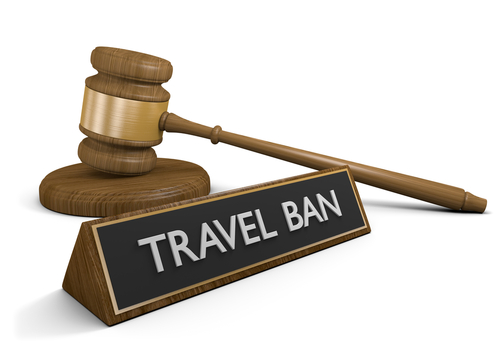Trump administration plans to ask Supreme Court to block latest travel ban ruling

Shutterstock.com
Updated: One day after a Hawaii district court narrowed the reach of President Donald Trump’s revised travel ban, U.S. Attorney General Jeff Sessions announced plans to ask the U.S. Supreme Court to block the latest travel ban ruling.
Sessions issued a statement Friday strongly criticizing U.S. District Judge Derrick Watson in Honolulu, who had ruled that the government’s interpretation of the travel ban was “unduly restrictive” and should exempt a wider group of relatives than the federal government had chosen to exempt. His ruling also exempted refugees who have formal help from a resettlement agency, which would end the 50,000-refugee cap imposed by the travel ban. That cap was reached this week.
“By this decision, the district court has improperly substituted its policy preferences for that of the executive branch,” Sessions said in a statement. “The district court has issued decisions that are entrusted to the executive branch, undermined national security, delayed necessary action, created confusion, and violated a proper respect for separation of powers.”
“The Supreme Court has had to correct this lower court once, and we will now reluctantly return directly to the Supreme Court to again vindicate the rule of law and the executive branch’s duty to protect the nation.”
As Reuters notes, the Supreme Court is not currently in session, but has discretion to grant an emergency request from the Justice Department. Such a request could be handled by Justice Anthony Kennedy—who has authority over the 9th Circuit, a group of western states that includes Hawaii—or by a vote of the full court.
Reuters also reported that the Justice Department attorneys handling the case have filed papers indicating that they will appeal Watson’s ruling to the San Francisco-based 9th U.S. Circuit Court of Appeals.
Earlier: A federal judge in Hawaii on Thursday narrowed the reach of President Donald Trump’s revised temporary travel ban after a federal appeals court decision on jurisdiction.
U.S. District Judge Derrick Watson ruled the travel ban can’t be used to exclude “grandparents, grandchildren, brothers-in-law, sisters-in-law, aunts, uncles, nieces, nephews, and cousins of persons in the United States.” BuzzFeed News, the Washington Post and the Honolulu Civil Beat are among the publications covering the decision.
The revised ban bars people from six Muslim-majority countries–Iran, Libya, Somalia, Sudan, Syria and Yemen–from entering the United States for 90 days and imposes a 120-day ban on refugees.
Watson’s ruling addressed guidelines adopted by the Trump administration after the U.S. Supreme Court said the travel ban could be enforced—except for immigrants with who have a bona fide “close familial relationship” with someone in the United States.
The administration’s guidelines say immigrants are exempt from the ban if they have a close family member in the United States, defined as a parent (including an in-law), spouse, child (including an adult child), son- or daughter-in law, and sibling (including a stepsibling or half-sibling), and fiancé or fiancée.
Watson said the government guidelines were “unduly restrictive.”
“The government’s definition represents the antithesis of common sense,” Watson said. “Common sense, for instance, dictates that close family members be defined to include grandparents. Indeed, grandparents are the epitome of close family members.”
Watson ruled on a request by Hawaii. He initially declined to rule in the case, saying Hawaii should seek relief in the U.S. Supreme Court since it had partly lifted an injunction that had prevented the travel ban from taking effect.
On appeal, the San Francisco-based 9th U.S. Circuit Court of Appeals said the federal court didn’t have authority to clarify the U.S. Supreme Court’s order on the travel ban, but said the court had the power to interpret or enforce the Supreme Court’s injunction, or to enjoin its violation.
Story updated at 2:14 p.m. to include information about Trump administration’s request to the U.S. Supreme Court.



